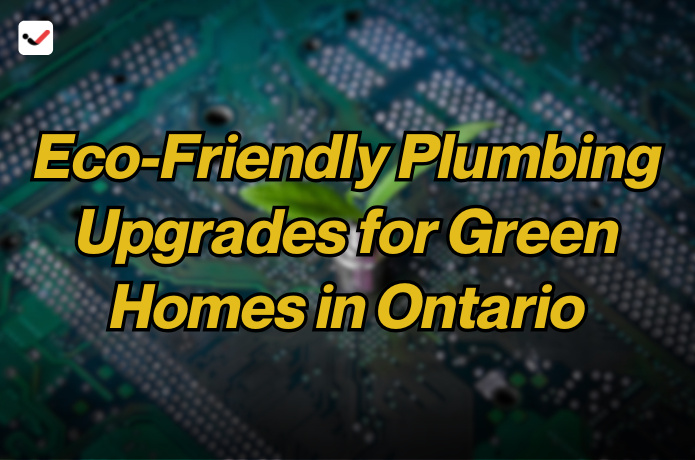Eco-Friendly Plumbing Upgrades for Green Homes in Ontario
Eco-Friendly Plumbing Upgrades for Green Homes in Ontario

As homeowners in Ontario become more environmentally conscious, eco-friendly upgrades are increasingly popular. One area where you can make a significant impact is your plumbing system. Upgrading to eco-friendly plumbing solutions not only reduces water and energy consumption but also helps lower utility bills and contributes to a more sustainable lifestyle. By implementing green plumbing practices, you can enhance the efficiency of your home and play a role in preserving natural resources.
Eco-friendly plumbing upgrades are designed to optimize water use, reduce waste, and minimize environmental impact. In Ontario, where water conservation is crucial due to varying climate conditions, these upgrades are particularly beneficial. This article will explore several eco-friendly plumbing solutions that can make your home greener while offering practical benefits and savings.
Low-Flow Fixtures
1. Low-Flow Toilets: Traditional toilets can use up to 13 liters of water per flush. Upgrading to a low-flow toilet can reduce this to 6 liters or less, significantly cutting down water usage. These modern toilets are designed to perform efficiently while conserving water, which is crucial for eco-friendly homes in Ontario.
2. Low-Flow Showerheads and Faucets: Installing low-flow showerheads and faucets can help reduce water consumption without sacrificing performance. These fixtures are designed to maintain water pressure while using less water, making them an excellent addition to any green home.
3. Dual-Flush Toilets: Dual-flush toilets offer two flushing options: a smaller flush for liquid waste and a larger flush for solid waste. This feature allows for more efficient water use, helping you save water with each flush.
Water-Efficient Appliances
1. High-Efficiency Dishwashers: Modern dishwashers are designed to use less water and energy compared to older models. Look for dishwashers with the ENERGY STAR® label to ensure you’re choosing an appliance that meets high-efficiency standards.
2. High-Efficiency Washing Machines: Front-loading washing machines are more water and energy-efficient than top-loading models. They use less water per load and often have shorter wash cycles, which can contribute to lower utility bills.
3. Water Softening Systems: Hard water can cause mineral buildup in pipes and appliances, reducing their efficiency and lifespan. Installing a water softener can prevent this buildup, leading to fewer repairs and longer-lasting appliances.
Leak Detection and Repair
1. Regular Leak Inspections: Regularly checking your plumbing system for leaks is crucial for water conservation. Even small leaks can waste a significant amount of water over time. Addressing leaks promptly helps prevent water damage and reduces overall water consumption.
2. Smart Leak Detectors: Consider installing smart leak detectors that can alert you to leaks or potential issues in real-time. These devices can help you catch leaks early and address them before they cause significant damage.
3. Pipe Insulation: Insulating your pipes helps prevent heat loss in hot water lines, which can improve the efficiency of your water heater. This simple upgrade can also reduce the risk of frozen pipes during Ontario's cold winters.
Greywater Recycling Systems
1. Greywater Recycling: Greywater systems recycle water from sinks, showers, and washing machines for use in irrigation and other non-potable applications. This reduces the amount of fresh water needed for landscaping and helps conserve water resources.
2. Rainwater Harvesting: Installing a rainwater harvesting system allows you to collect and store rainwater for use in irrigation and other non-potable applications. This can significantly reduce your reliance on municipal water supplies.
3. Filtration Systems: Ensure that your greywater recycling or rainwater harvesting systems include appropriate filtration to remove contaminants and make the recycled water safe for its intended use.
Energy-Efficient Water Heaters
1. Tankless Water Heaters: Tankless or on-demand water heaters heat water only when needed, eliminating the need for a storage tank and reducing energy consumption. This can lead to significant energy savings and lower utility bills.
2. Solar Water Heaters: Solar water heaters use the sun’s energy to heat water, making them a highly eco-friendly option. Although they require an initial investment, they can provide substantial long-term savings on energy costs.
3. Heat Pump Water Heaters: Heat pump water heaters use ambient air to heat water, making them more energy-efficient than traditional electric water heaters. They can reduce energy consumption and contribute to a greener home.
Conclusion
Eco-friendly plumbing upgrades are a practical way to enhance the sustainability of your home while saving money on utilities. By investing in low-flow fixtures, water-efficient appliances, and energy-efficient water heaters, you can significantly reduce your environmental footprint. Additionally, addressing leaks, utilizing greywater recycling, and incorporating smart technology can further optimize your home's water and energy use.
In Ontario, where conservation is particularly important due to varying water availability, these upgrades are especially beneficial. Embracing eco-friendly plumbing solutions not only contributes to a greener home but also supports a more sustainable future. Implement these upgrades to enjoy the benefits of reduced utility costs and a more environmentally responsible lifestyle.
